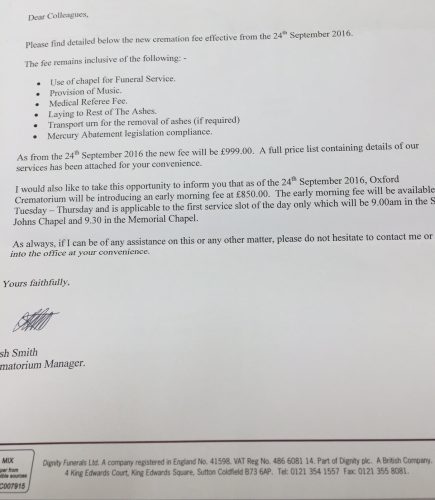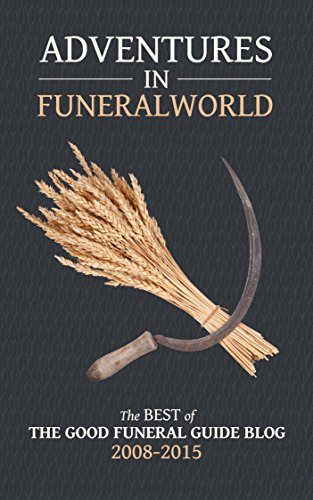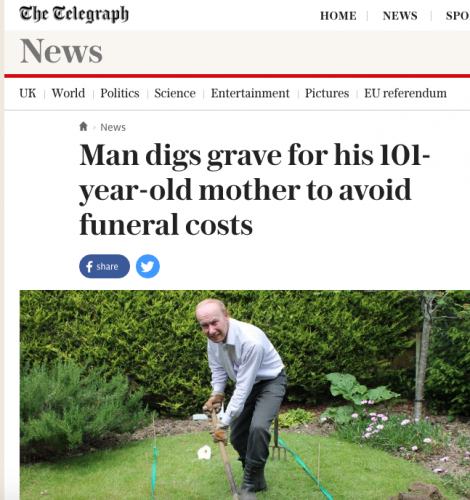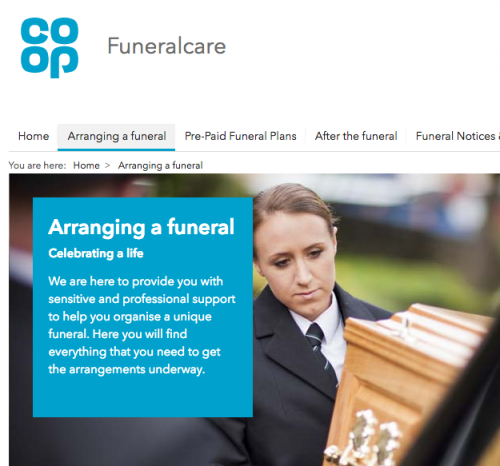Like you, at GFG Towers we’ve been waiting for summer to start. No sign so far, so rather than watching the umbrellas go up at Wimbledon yet again, we’ve wangled invitations to a whole number of gatherings of the great and the good in funeralworld. Indoor ones.
First up was a chance an invitation from Anne Barber of Civil Ceremonies Ltd to speak to a room full of celebrants at historic Buckden Towers last Saturday on the subject of ‘What lies ahead’.
In between a presentation about the Wesley System, a delightfully entertaining account from Evelyn Temple on becoming a funeral director, an encouragement to embrace Tea, Cake and Death (by the GFG Editor wearing her Poetic Endings hat) – and a rather stern warning to celebrants about the advance of direct cremations from Catherine Powell, we had a chance to talk about the future of the GFG and what we want to achieve. Despite the lack of Powerpoint presentation (and indeed any preparation other than a few scribbled notes; the fallout from the result of the EU referendum 24 hours earlier had sort of taken precedence over formulating a professional speech..!) the audience seemed to be interested to hear what we have up our sleeves. We met some very nice people, and got to hang out with them for a ‘Damage Limitation’ workshop at the end of the day where various disastrous funeral scenarios were posited and suggestions for remedying the situations shared.
Next up was a 200 mile round trip to Birmingham yesterday to the ICCM Seminar on Tackling Funeral Poverty. This was a corker! Delegates from across the sector of cemetery and crematorium management gathered together with a smattering of outsiders to listen to six speakers – Simon Cox from Royal London, Alex Strangwayes-Booth from the BBC, Heather Kennedy from Quaker Social Action, Nick Willcocks from yourfuneralchoice.com, Martin Birch from Cardiff City Council and Howard Hodgson… a well known name in the funeral industry.
Simon Cox kicked off the proceedings with a review of the Royal London 2015 findings and a sneak preview of the 2016 findings. His overview of the rising costs of funerals and the lukewarm government response to the Work and Pensions Select Committee’s recommendations was informative and detailed, and he ended with a warning about the projected cost of a funeral reaching £10,000 by 2033 if average funeral costs continue to rise on the same trajectory as in recent years.
Alex’s presentation detailed her research into the rising number of Public Health Funerals in the UK for a report for BBC News. She made a Freedom of Information request to all the councils responsible for carrying out Public Health Funerals to discover costs and numbers from 2010 to 2014.
Of 409 councils responsible for Public Health Funerals, 300 responded fully, providing her with months of data crunching to discover some fascinating and alarming facts. The North West of England carries out the most Public Health Funerals, the South East region has shown the biggest rise in numbers during the time period examined (32%), the South West region showed the biggest rise in cost to local authorities of Public Health Funerals (63%). And Birmingham carried out 245 Public Health Funerals in 2014. Councils recover approximately 50% of the costs involved, which amount to £1.7m p.a. Alex noted a huge discrepancy in the amount paid out by local authorities for each funeral, ranging between £300 and £2,000, and noted that there is no baseline.
During questions to the first two speakers, Julie Dunk from the ICCM spoke about the huge variation in the standard of provision of Public Health Funerals across the UK. Some local authorities offer a service with a minister, others just delivery to the cemetery or crematorium. There is no legal requirement to offer anything other than just the disposal of the body, but particularly in local authorities where Public Health Funerals come under the department for bereavement services, the standard of provision of funerals seems to be better. A national minimum standard would be generally approved of, but with ever dwindling council budgets, this scenario seems a long way away.
Angela Abbott, Bereavement Services Team Leader from Milton Keynes Council, shared her innovative solution to the quality and cost of providing Public Health Funerals – she and a colleague carry them out themselves. When they realised over £150,000 had gone out of the Milton Keynes council coffers to pay funeral directors to provide funeral services in recent years, they rolled up their sleeves and started collecting bodies and ordering coffins directly. As word got out, families who wanted some help with logistics but didn’t want to use a funeral director’s services got to hear about what Angela and James were doing, and they have now helped around 20 DIY families as well as carrying out 60 or so Public Health Funerals. The savings made to the council budget have allayed any concerns from above, and the quality of funerals they provide now meet Angela’s exacting standards – ministers, flowers and music are all a matter of course.
After coffee, we sat back to hear a response from Heather Kennedy, who talked about her work at QSA, the Funeral Poverty Alliance and the Fair Funerals Campaign. To date, 560 funeral director branches have signed up to the Fair Funerals Pledge representing 15% of the industry. She outlined some of the things that the Fair Funerals Campaign are asking for: municipal funeral services, setting of standard fees, better access to public health funerals, transparent fees and partnership with other departments.
Heather was followed by Nick Willcocks from yourfuneralchoice.com, the online price comparison website. He outlined the need for reliable online price comparison of funeral director services and explained how the website worked – and got rather a rough ride from a FD among the audience who seemed annoyed that the NAFD hadn’t been asked first before the website was launched.
We retired for lunch before the questioning became too tetchy, and sat with the lovely Charles Howlett from Chilterns Crematorium who talked about the huge changes he has seen during his life in the industry, and how much he welcomed discussions about doing funerals better rather than the merits of various cremator machinery, as ICCM meetings of the past had tended to focus on. Then we were back in the room for the last two speakers, and very interesting they were too.
Martin Birch talked about the municipal funeral service that has been provided for residents in Cardiff for 18 years by the council, in partnership with local funeral directors who tender for the opportunity. This service is available to any resident in Cardiff, and helps control local costs, offering a quality funeral with a hearse and one limousine, all FD services including collection, care, unlimited viewing during office hours and including one out of hours visit all for £1,030. Martin cited the local average costs for a funeral where cremation is chosen including disbursements other than a minister / celebrant as £4,500, whereas the comparable Cardiff City Funeral Service costs £1,708. Similarly local average costs for a funeral where burial is chosen are £5,000, while the CCFS offering is £2,320. Twelve per cent of funerals in Cardiff are carried out by CCFS.
We liked this very much indeed!
Then finally, the last speaker stepped up to speak about The Fashion of Death. Howard Hodgson was never going to be uncontroversial. We listened. We looked round the room and everyone was listening. And we asked him whether he would like to write a guest blog for the GFG. Watch this space – he was delighted to accept.
Just as a final note, at the end of the seminar there was a sharing session and the chair invited the various speakers to join different tables and talk about what they had heard during the day. He also suggested that the funeral directors sitting together at a table might like to do the same, as the ICCM members would undoubtedly be interested in hearing their thoughts. There was a flurry of movement as people rearranged themselves in groups.. and the FDs stayed exactly where they were. They didn’t move.
We mused on this metaphor as we drove back in the rain. The times they are a’changing, but some people just don’t want to budge.
Anyway, tonight we’re off to a party for the First Findings of The Corpse Project. We’ll report back. And next week holds a Cremation and Burial Communication and Education three day conference and a Child and Baby Funeral Choice seminar from the Child Funeral Charity. Lots going on at the moment so it’s probably just as well the sun hasn’t made an appearance yet.





